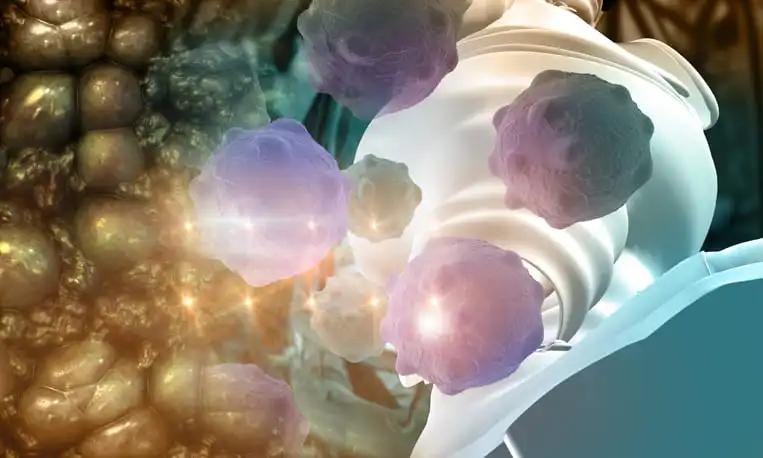KEY TAKEAWAYS
- The TACTI-002 phase 2 trial studied the effect of efti plus pembrolizumab in pts who had metastatic NSCLC and had become resistant to first-line PD-1/PD-L1 inhibitor-based therapy.
- The clinical trial’s primary endpoint was ORR by iRECIST, with secondary endpoints of DCR, PFS, OS, and tolerability.
- The final data showed that efti and pembrolizumab were safe and effective in NSCLC pts resistant to PD-1/PD-L1.
The phase II study involved patients (pts) who had metastatic non-small cell lung carcinoma (NSCLC) and had become resistant to first-line PD-1/PD-L1 inhibitor-based therapy, no matter their PD-L1 expression. The main objective was the objective response rate (ORR) by iRECIST, with secondary endpoints being disease control rate (DCR), progression-free survival (PFS), overall survival (OS), and tolerability.
Tumor growth kinetics (TGK) were assessed in post-hoc analysis. Patients received Eftilagimod alpha (E) (30mg SC Q2W for eight 3-week cycles and then Q3W up to 1 yr) and pembrolizumab (P) (200mg IV Q3W up to 2 yrs). They underwent imaging every nine weeks, with local assessment, and PD-L1 TPS was evaluated using the IHC 22C3 kit.
Thirty-six pts were enrolled from April 2019 to August 2021. The patients’ median age was 67 years, ranging from 46 to 84 years, and male patients accounted for 61%. The ECOG PS was 0 in 33% and 1 in 67%. Pts with squamous (19%) or non-squamous (78%) histology were present. All PD-L1 subgroups were included, with 39% having TPS <1% and 82% having TPS <50%. Pts administered the first-line treatment, either a PD-1/PD-L1 inhibitor alone (28%) or combined with platinum-based chemo (72%). Pts administered a median of 5(2–35) P and 7 (2–22) E doses. iRECIST analysis revealed that the ORR and DCR were 8.3% and 33%. All PRs were established only with pts who completed the study for 19 or more months. TGK analysis was conducted on pts with data available on the same lesions from previous unsuccessful treatment and post-baseline. A majority (83%) of patients experienced either a deceleration (50%) in tumor growth or shrinkage (33%) of target lesions. Median progression-free survival was 2.1 months, with 25% surviving six months. Median OS was 9.7 months, with 44% living up to 12 months. Decreased appetite (33%), dyspnea (31%), cough (28%), asthenia (22%), fatigue (19%), arthralgia (17%), and weight decreased (17%) were the most common events reported, with each affecting more than 15% of pts.
The combination of efti and pembrolizumab has proved safe and displayed encouraging signs of antitumor activity in NSCLC pts resistant to PD-1/PD-L1 inhibitors, warranting additional research.
Clinical Trial: https://classic.clinicaltrials.gov/ct2/show/NCT03625323
Tarruella, M.M., Forster, M.D., Krebs, M.G., Peguero, J., Clay, T.D., Felip, E., Iams, W., Roxburgh, P., Doger de Spéville, B., Bajaj, P., Mueller, C., Triebel, F. Journal of Thoracic Oncology (2023).









